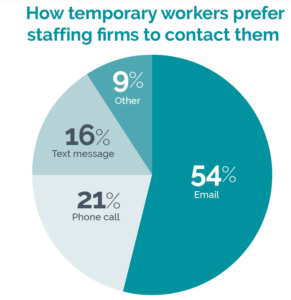You’ve been talking to temporary workers for years and have a pretty good idea what they need to know, right?
That’s probably mostly true, but temporary workers we surveyed — nearly 5,000 of them — revealed that important information is often lost in the shuffle. Here are eight topics that temporary workers said most need to be communicated effectively.
Character of the assigned job. One of the most common complaints temps reported was that their assigned duties on the job did not match the job description they were given, leaving them with a sense of bait and switch. In some reported cases the mismatch was minor, but in others it was more serious, such as this one reported by a healthcare temporary worker: “I was told it was oncology; it was cardiac. I have no training in this specialty.”
Terms of employment/pay and benefits. Like all of us, temporary workers are very particular about details such as hours to be worked, pay rate and benefits. There should be no lack of clarity on this issue. Are the hours expected to be steady or will they vary from week to week? Is the assignment really 40 hours a week or is it actually 37.5? Are the shifts eight hours a day or something else? Is a raise likely down the road? Is overtime available? Does your staffing firm offer any vacation or sick pay? And what are the details of healthcare benefits? All of the foregoing items are subjects that at least some temps we surveyed reported they had not been correctly informed on.
Assignment length/perm chances. This one is admittedly tricky. You often don’t really know how long an assignment will last or whether it will convert to a permanent position, and indeed the temporary worker’s performance — over which you have no control — is a major factor in those questions. Maybe the best advice here is to be frank about what you know and what you don’t.
Culture/management. Client culture can sometimes be a challenge for temporary workers. Some organizations are rigid, formal and demanding; others are chaotic and informal. Forewarned is forearmed — temps are more likely to successfully navigate such cultural challenges if they know the situation they’re walking into.
Logistics/dress code. Little details matter a lot when it comes to a candidate’s comfort and success in an assignment. If they don’t know where to park, they may have to look for a spot and arrive frustrated and late. If they don’t know the company dresses on the formal side, they may arrive wearing more casual clothes and feel they don’t t in. Details like these — as well as how to log time and whom to report to — shouldn’t have to be figured out on that hectic first day, but for some temps that’s just how it has been. Said one temporary worker whom we surveyed: “I wasn’t told where to park, whom to report to, etc. The first day at my job was a catastrophe.”
Performance feedback. When it’s all over, do you give your temporaries any kind of review on how it went? This is one of the areas of communication temps most want improved. It’s not just a reasonable courtesy — it may give them some pointers on how to do a better job next time.
Features of your firm’s website/app. Surveyed temps were asked whether their staffing firm offered to walk them through the features of their website and app. Only 40% reported that it had. Did walking them through the features make any difference? Well, those for whom these tools were explained were twice as likely to be aware of them and to find them useful. Yes, you can double the effectiveness of your technology investment simply by taking this one step.
Training/career development options. Surveyed temporary workers routinely say they’d like staffing rms to offer more training. That’s odd because more than half of staffing firms already offer training options, some of them very extensive. Do your temps really know the full extent of training you have available? Take the time to walk them through this as well — likewise for any career development opportunities you offer. In too many cases, staffing firms make a wise investment in enhancing the opportunities of their workers only to fail to take the ball across the finish line when it comes to communication.
How to Communicate
 What to communicate is very important, but so is how to communicate. We asked temporary workers: “How would you prefer staffing firms communicate/interact with you, including about schedule, job opportunities, pay, etc.?” More than half, 54%, prefer communication via email. Another 21% prefer phone calls, and only 16% prefer text messages.
What to communicate is very important, but so is how to communicate. We asked temporary workers: “How would you prefer staffing firms communicate/interact with you, including about schedule, job opportunities, pay, etc.?” More than half, 54%, prefer communication via email. Another 21% prefer phone calls, and only 16% prefer text messages.
Consider a Checklist
If all this looks like a handy checklist, maybe it should be. When it comes to getting details right, checklists can make a huge difference. Just ask anyone in healthcare.
ICU units have long been plagued by accidental patient infections. In 2001, skeptical doctors at Johns Hopkins Hospital were persuaded to try applying a checklist to routine procedures. The results astounded even the skeptics. Over a short test period, the checklist prevented 43 infections and saved eight lives. The stakes aren’t quite that high for staffing firms, but a communication checklist might improve the experience of your temporary workers — and happy temporary workers come back for more.







